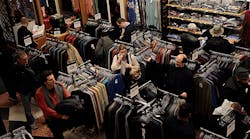On Oct. 21, a new initiative led by the world’s best known brands, retailers, industry groups and humanitarian organizations was launched to improve working conditions in apparel manufacturing across the world.
The project seeks to achieve real, sustainable change through the collective development of an industry-wide, standardized methodology for social and labor performance assessment in the apparel and footwear supply chains. The industry believes that it will be able to significantly reduce the amount of money that it spends on duplicated auditing and invest the money saved in improving social welfare for the millions of people employed in apparel manufacturing around the world.
This collaborative effort is being facilitated by the Sustainable Apparel Coalition (SAC). Signatories to the public statement include apparel manufacturers Nike, H&M, VFc-Timberland, Levi Strauss & Co., PVH Corp., Target, Columbia Sportswear Co. and adidas; standard holding organization WRAP; the non‐profit supply chain improvement experts SEDEX; NGO Solidaridad; auditing firms Bureau Veritas and SGS; the International Apparel Federation and many others stakeholders at all levels in the value chain. The signatories are keen to attract more supporters to join this collaborative effort.
“The industry, having heard the call from so many different stakeholders, is convinced that the time has come to create greater alignment,” said Baptiste Carriere-Pradal, vice-president, Europe, of SAC. “We want to check less and act more: This initiative will accelerate a race to the top in social impacts within apparel and footwear manufacturing countries by shifting resources away from redundant and misaligned assessments to performance improvement and enhanced transparency. Convergence is the key to successfully increase transparency and to improve working conditions in global supply chains.”
Tobias Fischer, sustainability manager for H&M said that his company “strongly believes that the sustainability challenges we are facing in the textile supply chain requires joint efforts since all parties have a shared responsibility and have a stake in it. This was one of the key reasons H&M joined SAC as a founding member in 2010.”
He said the company acknowledges the challenge to agree on a common standard. “However,” he added, “the industry has changed, the experiences from different initiatives (e.g. Zero Discharge of Hazardous Chemicals, The Accord and Alliance in Bangladesh) show that the industry has taken significant steps forward and are willing to find joint solutions for a common good. H&M is therefore ready to support this project for a common social assessment in the apparel supply chain.”
Marieke Weerdesteijn from Solidaridad noted that according to the World Trade Organization, world exports in clothing and textiles reached nearly $800 billion in 2013. It is estimated that more than $1 billion annually is spent on social compliance audits in China alone.
“There is a lot of redundancy in social auditing,” she claimed. “Dramatically reducing the number of audits by using one common assessment would allow for redirecting time and money towards improving working conditions in the apparel sector. The textile sector needs to focus more on continuous improvement rather than compliance.”
The initiative, which follows the implementation of a successful framework on environment by the SAC, seeks to provide an answer to calls from the European Commission, the Organisation for Economic Co-Operation and Development (OECD) and a number of European countries for a standardized, global approach.
“As a company with a pioneering record on labor rights and a long history of industry collaboration, we welcome the opportunity to explore how to support more effective and efficient ways to raise labor standards in the apparel supply chain,” said Michael Kobori, VP of sustainability at Levi Strauss & Co.
“Since the birth of ethical sourcing in the apparel and footwear supply chain more than 20 years ago, there has been a proliferation of differing codes, audits, protocols and approaches as part of company efforts,” said Jonathan Ivelaw-Chapman, CEO of Sedex. “This duplication and lack of convergence causes issues for the industry, drains suppliers’ resources and makes it difficult to benchmark their efforts. We hope that this new project will help drive convergence and encourage others to join us in this exciting collaboration.”
